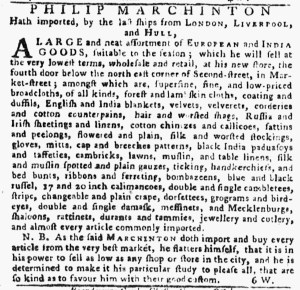What was advertised in a colonial American newspaper 250 years ago today?

“He flatters himself, it is in his power to sell as low as any shop or store in the city.”
Philip Marchington commenced a new advertising campaign at the beginning of October 1773. His advertisements in the October 6 issues of the Pennsylvania Gazette and the Pennsylvania Journal both included a notation, “6 W,” that advised the compositors to run them for six weeks and then remove them from those newspapers. Marchington did not anticipate that anyone outside the printing offices would pay much attention to those notations. Instead, he wanted prospective customers to focus on the “LARGE and neat assortment of EUROPEAN and INDIA GOODS” that he recently imported “by the last ships from LONDON, LIVERPOOL, and HULL.”
Marchington’s advertisements followed a familiar format. They commenced with a brief description of where and when he acquired his merchandise, suggesting to consumers that he did not merely peddle leftovers that he had not been able to sell. The merchant declared that his new inventory was “suitable to the season” and made an appeal to price, offering “the very lowest terms.” He devoted most of the advertisement to demonstrating the choices available his “assortment” of goods, listing a variety of textiles as well as “silk and worsted stockings” and “jewellery and cutlery.” In addition, he claimed to stock “almost every article commonly imported,” putting him in competition with Andrew Bunner, William Price, and other merchants and shopkeepers who ran advertisements in the several newspapers published in Philadelphia.
Marchington deviated from that familiar format in the final lines of his advertisement. He appended a nota bene in which he provided a short explanation about how he could “sell at the very lowest terms,” circling back to the appeal that he made before listing his wares. The merchant explained that he “doth import and buy every article from the very best market.” In the process, he avoided unnecessary markups. As a result, “it is in his power to sell as low as any shop or store in the city.” He did not go into greater detail, content with reminding prospective customers of his low prices before making a final pledge “to make it particular study to please all, that are so kind as to favour him with their good custom.” Low prices and good customer service went hand in hand at Marchington’s store. Like many other merchants and shopkeepers, Marchington mostly adhered to a familiar format while choosing a small variation to distinguish his advertisement from others.
